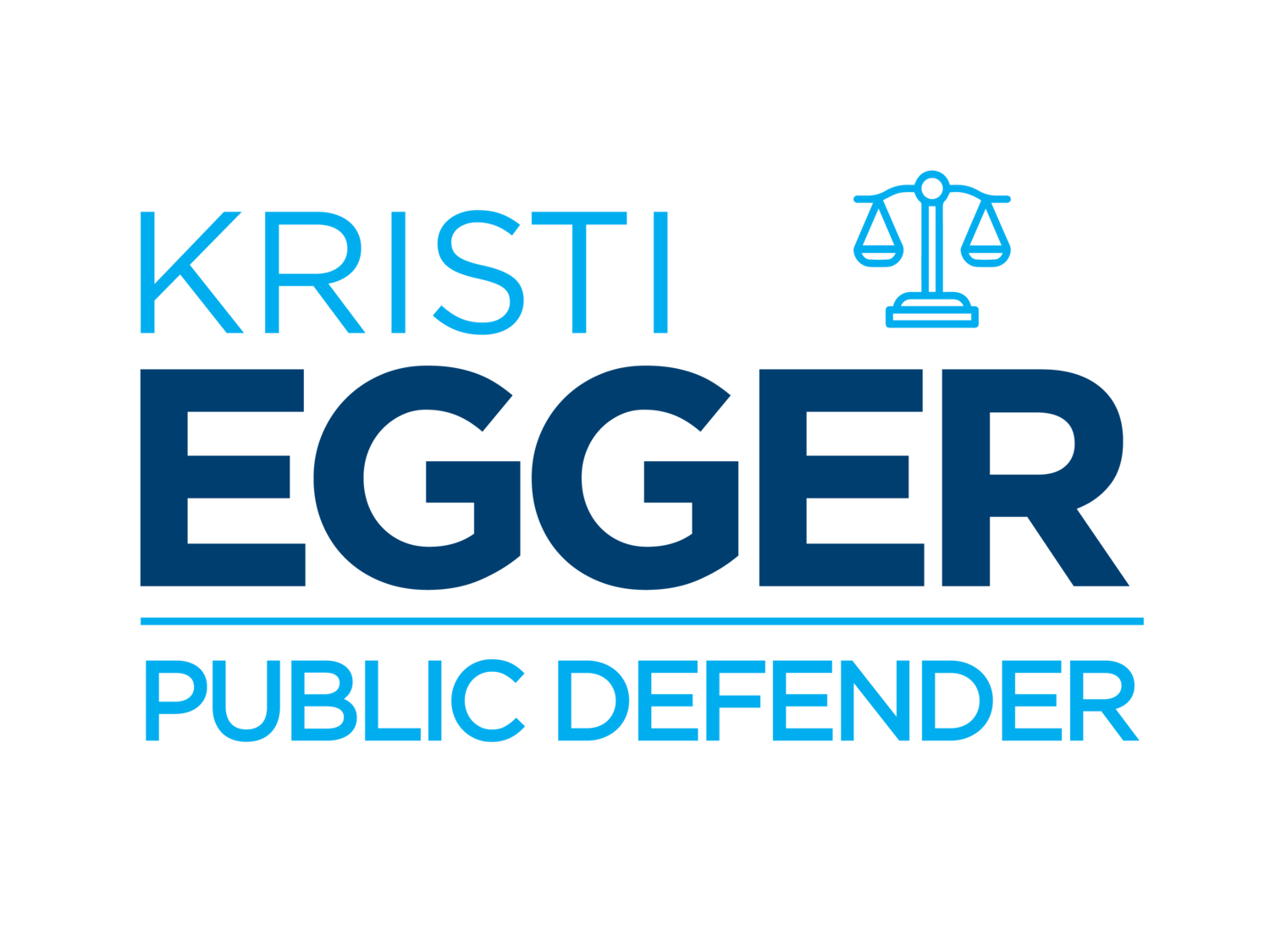Dedication
Experience
Ethical Justice
Fiscal Responsibility
Thank you for electing me to serve the people of Nebraska. I’m not a politician. I ran because Lancaster County deserved an experienced Public Defender with the proven dedication, knowledge, and work ethic to provide effective leadership for the Office. This is a complex job, requiring deep knowledge and a specific skill set. For 32 years, I served Lancaster County as a Deputy Public Defender. Now I am proud to lead the Office as your elected Public Defender.
This is my calling.
“Kristi is a zealous advocate for our indigent population in Lancaster County. She has a stellar reputation of upholding the Constitutional rights of her clients and has worked diligently to ensure that the folks she represents have her time and attention. Kristi will show up and do the job.”
-Susan Tast, Lancaster County Deputy Public Defender; Asst. City Attorney, (retired)
“My friend and former employee Kristi Egger is running for election to the office of Lancaster County Public Defender. Please vote for her. I have known Kristi for over thirty years. I have personally observed her to be a hardworking, dedicated fighter for the rights of those accused of crimes. She is a lawyer who can be counted upon in a struggle. Kristi will be there! The office of Public Defender is an important component of county government. The office holder should be someone who cares about the mission and the county employees who work there. Kristi’s election to the office would be a distinct improvement to the leadership of that office and I sincerely urge the voters of Lancaster County to elect her.
-Sean Brennan, Brennan, Nielsen, & Wooster Law Office, Lincoln
“Please join me in voting for Kristi Egger as Lancaster County Public Defender. It has often been said that a society is measured by how it treats its most vulnerable members. It is hard to imagine a more vulnerable person than one who is poor and accused of a crime or facing a civil commitment. It is not easy to represent these people. In addition to the fact that they are afflicted with the worst disease of all - poverty - they frequently suffer from mental illness, addiction, and a lack of basic living and social skills. A public defender is part lawyer, part therapist, and part social worker. I’ve known Kristi for 25 years, and I cannot think of a person who combines these roles better than her.”
-Matt Catlett, Law Office of Matt Catlett, Lincoln
“In my observation in Lancaster County District and County Court, Ms. Egger is a zealous advocate for her clients. She is well-versed in the law. She exhibits the utmost professionalism toward prosecutors while tirelessly fighting for the rights of indigent defendants.”
-Douglas Kerns, Kerns Law Office, Lincoln
Lincoln Journal Star, December 15, 2022
Two Lancaster County Board incumbents win reelection, along with one newcomer“The public defender’s office will be headed by Democrat Kristi Egger, who bested Republican opponent Trevin Preble in Tuesday’s election, after beating her former boss and incumbent Joe Nigro in the primary.”
“Egger worked as a deputy public defender for 33 years before retiring in January to launch her campaign. Egger garnered 55,775 votes to 48,372 for Preble, a Republican attorney.”
Lincoln Journal Star, May 11, 2022
Democratic challenger unseats former boss in Lancaster County public defender's raceLincoln Journal Star, March 9, 2022
City Hall: Election politics, noting a tragedy and lighting up a council meetingLincoln Journal Star, January 14, 2022
Longtime Lancaster County Deputy Public Defender Announces Candidacy For Top Job In Office Kristi Egger, who retired this month after 32 years as an attorney in the Lancaster County Public Defender’s Office, is running for the top spot. Egger, who filed Wednesday as a candidate for Lancaster County Public Defender, said she decided it was the right time to run.
Joe Nigro, who has served two terms as public defender, has not officially announced whether he plans to run for reelection, although he has a campaign kickoff event scheduled in February.
Both Egger and Nigro are Democrats.
Egger, who worked for a year in the Hall County Public Defender’s office before moving to Lancaster County, said she thinks it’s time a woman be considered for the office, and the county needs a public defender who's in the office and spends time in the courtroom.
She said she has worked on all kinds of cases during her career and has the abilities needed to run the office effectively.
“I would be someone who would go to court, take cases and handle cases,” she said. “I would be in the office and able to answer questions of staff and attorneys. I’d actually be there to supervise.”
She said it’s important for the public defender to be in court regularly to understand the issues that arise when defending cases and that’s not happening now.
Egger said she has a passion for mental health cases and that more needs to be done to find alternatives to incarceration for the mentally ill and substance dependent.
She said she also would review the system in place to decide how cases are assigned in the office to reduce the number that have to be handled by private attorneys, which would save taxpayers money.
The Lancaster County Public Defender’s office was created in the early 1970s, and T. Clement Gaughan became the first elected public defender in 1974. He held the office until 1978, when Dennis Keefe was elected. When Keefe retired, Nigro was elected.
Egger said diversity is important, and it’s important to have more women in offices of power.
“We should have been there from the beginning — we’re more than 50% of the population,” she said. “So it seems to me I’m just as capable as any man who’s been a public defender, and we need to be getting ourselves into those positions of power.”
Egger is a lifelong Nebraskan who grew up between Firth and Hickman and graduated from Norris Public Schools, then from the University of Nebraska College of Law. She clerked at the Lancaster County Public Defender’s office while in law school, before going to Hall County for a year.
Lincoln Journal Star, June 27th, 2018
Lincoln officials seek solutions to keep people with mental illness out of jail
On a recent afternoon, Rebecca Meinders, the social worker, and Kristi Egger, the deputy public defender who handles the mental-health docket, sat down to talk about what they see on a daily basis.
Meinders pointed to a Medicaid policy that says patients have to fail at every other level of treatment before they're approved for in-patient care.
When people don't get the level of care they need, she said, it leads to more police calls, more family issues and more police citations.
"It's a tiny little pebble," Meinders said. "But those ripples get so big that eventually you're looking at law enforcement having 3,100 mental-health investigation calls in 2016.”
Egger called the number amazing.
"Just think of the time," she said.
Criminal charges
Police officers have to go out on all those calls and deal with the people on the street, then potentially testify if there's a mental health hearing.
The person taken into custody may end up facing charges, too -- felony offenses -- for things like assault on an officer or health care professional.
Egger said it doesn’t make sense to her that people with severe mental illness are charged criminally for what they did while in crisis if they have already gone before the Mental Health Board.
“It seems like it is penalizing people who suffer from a mental illness,” she said. “It doesn’t seem fair to me.”
Meinders said just because someone is sent to the regional center, it doesn't mean the criminal case goes away.
She and Egger said others accused of misdemeanors may end up languishing in jail or at the regional center waiting longer for competency evaluations than judges could have sentenced them to for their crime.
Egger said it means defense attorneys have to think twice before filing competency motions in misdemeanor cases "because the time they spend waiting is awful."
Meinders said it also leads to longer waits for regional center beds for those at the Crisis Center or area hospitals because competency cases take priority.
There are still others who are mentally ill who aren't dangerous like one man who got in trouble for calling 911 thousands of times, she said.
"There isn't enough evidence to (take him into emergency protective custody) but something has to be done," Meinders said.
He's gotten three tickets, but it hasn't stopped him from calling.
Meinders, who started full-time in the office in December 2016, said she meets with clients, their families and support system to try to present a more whole picture to the court.
Like explaining, in one case, how a man in front of the court 100 times experienced childhood trauma as a Lost Boy of Sudan, she said.
Meinders describes it all as a kind of bull's-eye. The middle is the legal charge that brought them to the office.
"And then everything outside of that legal charge is kind of on the table for me to deal with," she said.



